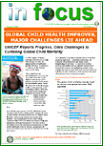|
Caring for Children-Communities Can!
The Caring for Children Communities Can! program reflects a long-term partnership between CECHE and the Georgetown University Center for Child and Human Development (GUCDC). The program supports a network of communities committed to comprehensive, coordinated systems of services and supports for all children, including those with or at risk for disabilities and their families. It is coordinated by GUCDC and directed by federal agencies dedicated to serving and supporting children, youths, and families (http://gucchd.georgetown.edu/programs/ta_center/communities_can/). The program aims to accomplish the following:
- Bring families, businesses, providers, community leaders, and neighbors together to make sure that our communities nurture and support all children and families.
- Link communities with other communities to learn from their experiences. The program has a list-serve just for members¾ask questions about how other communities have approached challenges, ask for information about policies and implementation, receive bulletins about new materials and resources, learn about successful models for serving families and children.
- Connect communities with information about how to serve and support all families better
- Help communities develop community leadership
- Give communities a voice in policy decisions at all levels
- Work with local governments and national organizations to recognize and publicize the achievements of member communities. Communities Can! has developed specialized training programs on collaborative problem solving/dispute resolution and on community leadership development.
International Component
A major program focus has been US communities. The experience from the US communities was disseminated to communities throughout central and Eastern Europe through the Open Society Step-by-Step initiative that is working on school reform throughout the region and the annual planning meeting and dissemination meeting of the International Congress of Children with Special Needs. At the last congress, teams came from Slovakia, Czech Republic, Hungary, Armenia, Ukraine to do systems development planning for children with special needs.
Scenes from the Communities Can Project

Through the Eyes of Children is another international endeavor that gathered from around the world artwork and photography, with the theme of evoking children's perspectives of their world. Countries included the Czech Republic, Romania, Russia, Slovakia, Hungary, India, Iran, Egypt, South Africa, St. Thomas, Senegal, Israel, and the United States.
Communities Can International Promotes Education For All
Currently, children, youth and adults with disabilities are among the groups most excluded from receiving a basic education. In fact, an estimated 90 percent of children with disabilities in developing countries do not attend school.
To help ensure access to and promote completion of quality education for every child, youth and adult with a disability, Communities Can International participated in founding A Flagship on Education for All and the Right to Education for Persons with Disabilities: Towards Inclusion. The flagship is an alliance of global disability organizations, international development and intergovernmental agencies, and experts in the fields of special and inclusive education from developed and developing nations.

Communities Can International is actively engaged in the flagship’s secretariat at UNESCO. UNESCO actively advocates the right to education for all children, youth and adults, including those with disabilities, in its current Education for All (EFA) initiative, a major global program expected to result in all children receiving a basic education by 2015. The initiative is endorsed by all countries and supported by a wide range of multilateral/bilateral donors and international organizations.
Currently, the flagship is assisting nations in implementing their national plans for EFA, as well as the inclusion of children with disabilities, through a variety of activities and actions, including:
- Promoting full participation of persons with disabilities and families in development of policies and practices on education at local, national, regional and global levels
- Seeking to ensure that all governmental entities, donors and nongovernmental organizations endorse the universal right of education for all children, youth and adults with a disability
- Acting as a catalyst to incorporate fully the flagship goal into national plans of action and regional policies
- Mobilizing resources in support of the flagship goal through obtaining the commitment of new resources from national and international entities, and leveraging existing EFA resources
- Ensuring that EFA monitoring includes quantitative and qualitative data related to persons with disabilities and documentation of resources allocated to the implementation of EFA for these individuals
- Identifying and disseminating effective practices, and stimulating research and studies related to the flagship goal through training and technical activities.
Education and life-long learning opportunities can erase the major gaps in economic and social development that effectively marginalize individuals with disabilities. Through EFA and the flagship, nations can receive support to assure a basic education for all.
Through its extensive network in the CEE-NIS, in 1992-93 CECHE assisted the Georgetown University Center for Child and Human Development in launching the project in Central and Eastern Europe, and CECHE remains a GUCDC partner in the project.
|
|

 Go back to the CECHE home page
Go back to the CECHE home page



